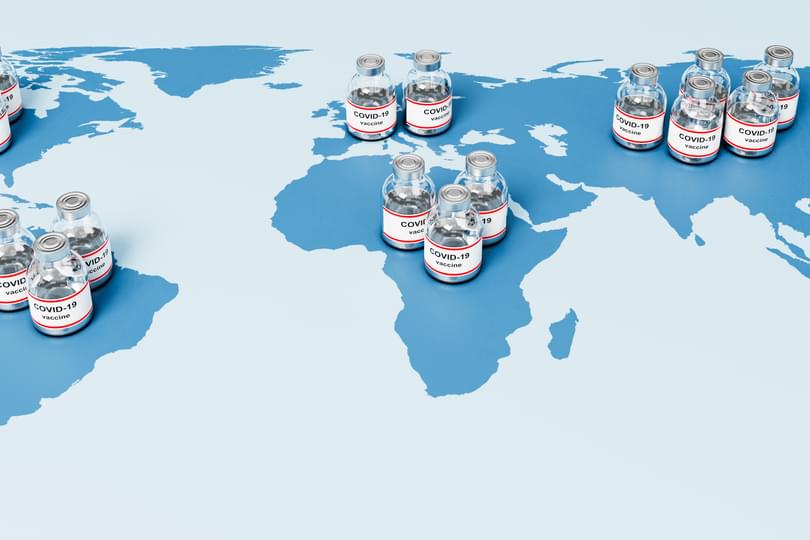
We are now into the second year of life with COVID-19. Although we have overcome the first enormous challenge of swiftly developing and approving several effective vaccines, we are far from ending the pandemic.
Most of the vaccines produced to date have been acquired in excess by wealthy countries - Canada has purchased enough vaccines to inoculate its population five times over. Yet, poor countries are lagging significantly behind and it is estimated that it may take several years
for people in the lowest-income groups to be vaccinated.
Pharmaceutical companies refuse to share their vaccine technologies
How can we accelerate the production of COVID-19 vaccines and ensure their equitable worldwide distribution at an affordable price to truly end this pandemic?
Numerous calls for sharing vaccine technologies to boost the production of vaccines have been made. This includes the WHO COVID-19 Technology Access Pool (C-TAP) that calls on the global community, and most importantly pharmaceutical companies, to voluntarily share knowledge, intellectual property and data necessary to defeat COVID-19. However, it has attracted zero contributions since it was established in May 2020. Pharmaceutical companies refuse to share their vaccine technologies with this and similar initiatives.
Instead, they are focused on scaling-up their own manufacturing capacities and striking bilateral deals with other companies to produce their vaccines. There are some exceptions, Oxford/AstraZeneca vaccine technology, for example, has been licensed for production in India and Brazil and the vaccines are currently provided on a not-for-profit basis. However, the pandemic is global and billions of vaccine doses are required worldwide at an accelerated speed. The current set up of vaccine production is undoubtedly insufficient, but it can be improved and accelerated.
First, governments should employ short-term solutions to immediately increase vaccine manufacturing by exploiting all existing manufacturing capacity available worldwide, including in developing countries. Vaccines based on more established vaccine technologies like the viral vector technology used by Johnson & Johnson and Oxford/AstraZeneca, could potentially be manufactured with few fundamental adjustments to the existing vaccine production facilities. This increase could be based on voluntary technology transfers by open licensing, or on such mechanisms as compulsory licensing of vaccine technologies protected by intellectual property. Another option suggested by South Africa and India, and supported by the US, is to waive certain IP rights, including patents, under the WTO TRIPS agreement to remove IP barriers to the timely provisioning of affordable COVID-19 medical products.
Immediately increase vaccine manufacturing by exploiting all existing manufacturing capacity
A sharp increase in vaccine production may not be possible for vaccines that are based on new technologies, such as mRNA, due to the lack of availability of special manufacturing equipment in most countries, including developed countries. Therefore, the second step should include strategic objectives, which would ensure the ability to produce necessary volumes of vaccines for annual inoculation against COVID-19 by all types of vaccines, as well as other vaccines and medicines in case of new pandemic threats in the future.
The combination of the dependence of most countries on vaccine import and the recent restrictions on vaccine export in several countries, including the EU, US and India, has highlighted the need for local production capability increases around the world. Some countries have already started implementing these objectives pledging to invest hundreds of millions in vaccine manufacture. For example, the UK government announced investments in vaccine production of over £240 million in 2020. Similarly, Canada and Australia are investing in their local vaccine manufacturing facilities to secure long term vaccine supplies and in March 2021, the US announced a new partnership with India, Japan, and Australia, that will finance additional vaccine manufacturing capacity.
More fundamentally, governments should reconsider the current system of medical innovation. The state should assume the responsibility for the pandemic preparedness by setting a comprehensive infrastructure of research into and production of medicines needed for health security. As part of this solution, governments may consider exploring the creation of publicly funded non-profit pharmaceutical companies.
In addition, governments should consider developing a new model of open innovation. Despite the great potential that the open innovation model may bring to society, the pharmaceutical industry has been hesitant to engage in it voluntarily, exemplified by the refusal of pharmaceutical companies to share their intellectual property protected vaccine technologies with the open innovation pledges discussed above even in the face of a global pandemic.
It is paramount that governments utilise all available mechanisms, at least in the short-term, to ensure swift and equitable access to COVID-19 vaccines and non-discrimination of poor countries. This requires efforts at international level in the form of the cooperation and good will of wealthy countries. On 30 March 2021, driven by the need to protect the world from future health crises, the WHO and a number of countries announced that they would be designing a new international treaty for pandemic preparedness and response. This could become a useful instrument for coordinating efforts in protecting global health and we hope that the suggestions discussed here may be implemented in this treaty, with all countries committing to its objectives and obligations.
See our new paper on ‘COVID-19, IP and access: will the current system of medical innovation and access to medicines meet global expectations?’ (forthcoming in the Journal of Generic Medicines), where we discuss the role of intellectual property rights in accessing COVID-19 therapeutics, and mechanisms that may be implemented by governments to protect public health. These include short-term mechanisms, such as compulsory licensing, as well as long-term solutions in the form of state-coordinated research of medicines and open innovation. The pre-print version can be accessed here.
This opinion piece reflects the views of the author, and does not necessarily reflect the position of the Oxford Martin School or the University of Oxford. Any errors or omissions are those of the author.

